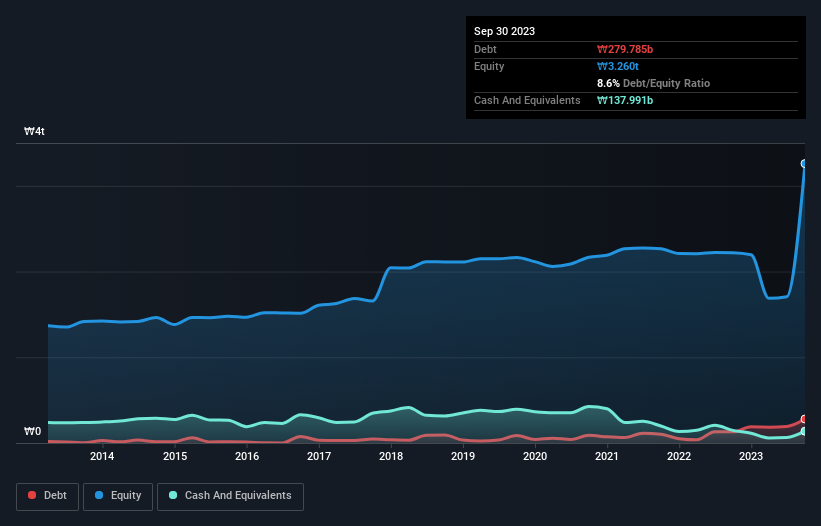- South Korea
- /
- Trade Distributors
- /
- KOSE:A005440
Hyundai G.F. Holdings (KRX:005440) Takes On Some Risk With Its Use Of Debt

David Iben put it well when he said, 'Volatility is not a risk we care about. What we care about is avoiding the permanent loss of capital.' So it might be obvious that you need to consider debt, when you think about how risky any given stock is, because too much debt can sink a company. As with many other companies Hyundai G.F. Holdings Co., Ltd. (KRX:005440) makes use of debt. But should shareholders be worried about its use of debt?
When Is Debt A Problem?
Debt and other liabilities become risky for a business when it cannot easily fulfill those obligations, either with free cash flow or by raising capital at an attractive price. In the worst case scenario, a company can go bankrupt if it cannot pay its creditors. However, a more common (but still painful) scenario is that it has to raise new equity capital at a low price, thus permanently diluting shareholders. By replacing dilution, though, debt can be an extremely good tool for businesses that need capital to invest in growth at high rates of return. The first thing to do when considering how much debt a business uses is to look at its cash and debt together.
See our latest analysis for Hyundai G.F. Holdings
What Is Hyundai G.F. Holdings's Debt?
The image below, which you can click on for greater detail, shows that at September 2023 Hyundai G.F. Holdings had debt of ₩279.8b, up from ₩130.6b in one year. However, because it has a cash reserve of ₩138.0b, its net debt is less, at about ₩141.8b.

How Healthy Is Hyundai G.F. Holdings' Balance Sheet?
The latest balance sheet data shows that Hyundai G.F. Holdings had liabilities of ₩882.2b due within a year, and liabilities of ₩560.2b falling due after that. Offsetting this, it had ₩138.0b in cash and ₩688.0b in receivables that were due within 12 months. So its liabilities total ₩616.4b more than the combination of its cash and short-term receivables.
This deficit is considerable relative to its market capitalization of ₩679.8b, so it does suggest shareholders should keep an eye on Hyundai G.F. Holdings' use of debt. This suggests shareholders would be heavily diluted if the company needed to shore up its balance sheet in a hurry.
We measure a company's debt load relative to its earnings power by looking at its net debt divided by its earnings before interest, tax, depreciation, and amortization (EBITDA) and by calculating how easily its earnings before interest and tax (EBIT) cover its interest expense (interest cover). Thus we consider debt relative to earnings both with and without depreciation and amortization expenses.
Hyundai G.F. Holdings has net debt of just 1.2 times EBITDA, suggesting it could ramp leverage without breaking a sweat. But the really cool thing is that it actually managed to receive more interest than it paid, over the last year. So it's fair to say it can handle debt like a hotshot teppanyaki chef handles cooking. Better yet, Hyundai G.F. Holdings grew its EBIT by 10,566% last year, which is an impressive improvement. If maintained that growth will make the debt even more manageable in the years ahead. The balance sheet is clearly the area to focus on when you are analysing debt. But ultimately the future profitability of the business will decide if Hyundai G.F. Holdings can strengthen its balance sheet over time. So if you're focused on the future you can check out this free report showing analyst profit forecasts.
Finally, a company can only pay off debt with cold hard cash, not accounting profits. So it's worth checking how much of that EBIT is backed by free cash flow. Over the last three years, Hyundai G.F. Holdings saw substantial negative free cash flow, in total. While investors are no doubt expecting a reversal of that situation in due course, it clearly does mean its use of debt is more risky.
Our View
We feel some trepidation about Hyundai G.F. Holdings's difficulty conversion of EBIT to free cash flow, but we've got positives to focus on, too. To wit both its interest cover and EBIT growth rate were encouraging signs. Looking at all the angles mentioned above, it does seem to us that Hyundai G.F. Holdings is a somewhat risky investment as a result of its debt. Not all risk is bad, as it can boost share price returns if it pays off, but this debt risk is worth keeping in mind. There's no doubt that we learn most about debt from the balance sheet. However, not all investment risk resides within the balance sheet - far from it. We've identified 3 warning signs with Hyundai G.F. Holdings (at least 2 which make us uncomfortable) , and understanding them should be part of your investment process.
If you're interested in investing in businesses that can grow profits without the burden of debt, then check out this free list of growing businesses that have net cash on the balance sheet.
If you're looking to trade Hyundai G.F. Holdings, open an account with the lowest-cost platform trusted by professionals, Interactive Brokers.
With clients in over 200 countries and territories, and access to 160 markets, IBKR lets you trade stocks, options, futures, forex, bonds and funds from a single integrated account.
Enjoy no hidden fees, no account minimums, and FX conversion rates as low as 0.03%, far better than what most brokers offer.
Sponsored ContentValuation is complex, but we're here to simplify it.
Discover if Hyundai G.F. Holdings might be undervalued or overvalued with our detailed analysis, featuring fair value estimates, potential risks, dividends, insider trades, and its financial condition.
Access Free AnalysisHave feedback on this article? Concerned about the content? Get in touch with us directly. Alternatively, email editorial-team (at) simplywallst.com.
This article by Simply Wall St is general in nature. We provide commentary based on historical data and analyst forecasts only using an unbiased methodology and our articles are not intended to be financial advice. It does not constitute a recommendation to buy or sell any stock, and does not take account of your objectives, or your financial situation. We aim to bring you long-term focused analysis driven by fundamental data. Note that our analysis may not factor in the latest price-sensitive company announcements or qualitative material. Simply Wall St has no position in any stocks mentioned.
About KOSE:A005440
Hyundai G.F. Holdings
Engages in the departmental store businesses in the South Korea.
Undervalued with excellent balance sheet.
Market Insights
Community Narratives




